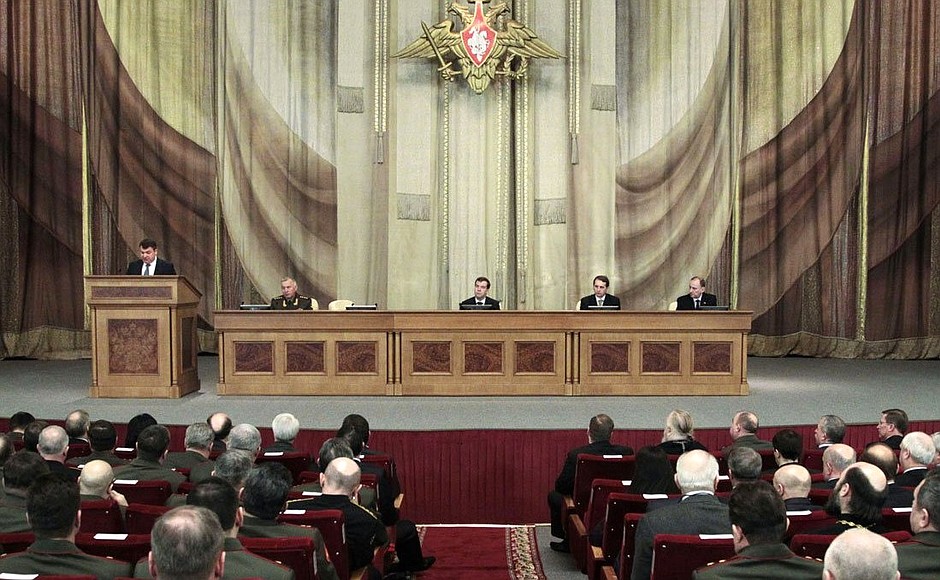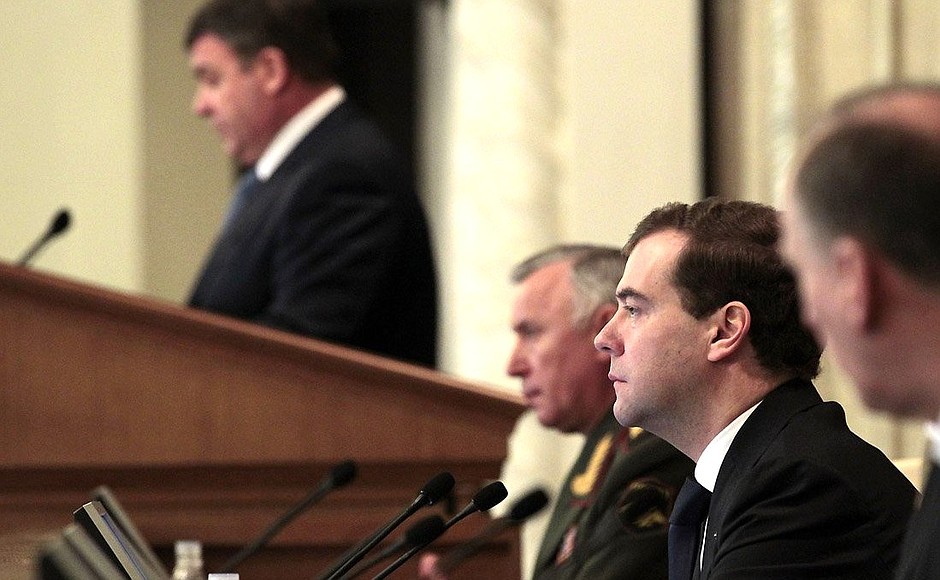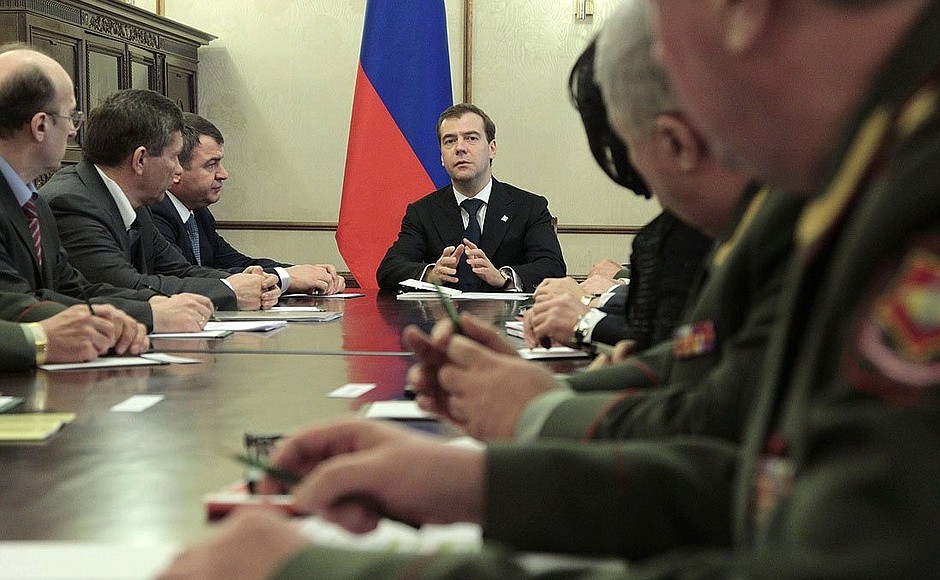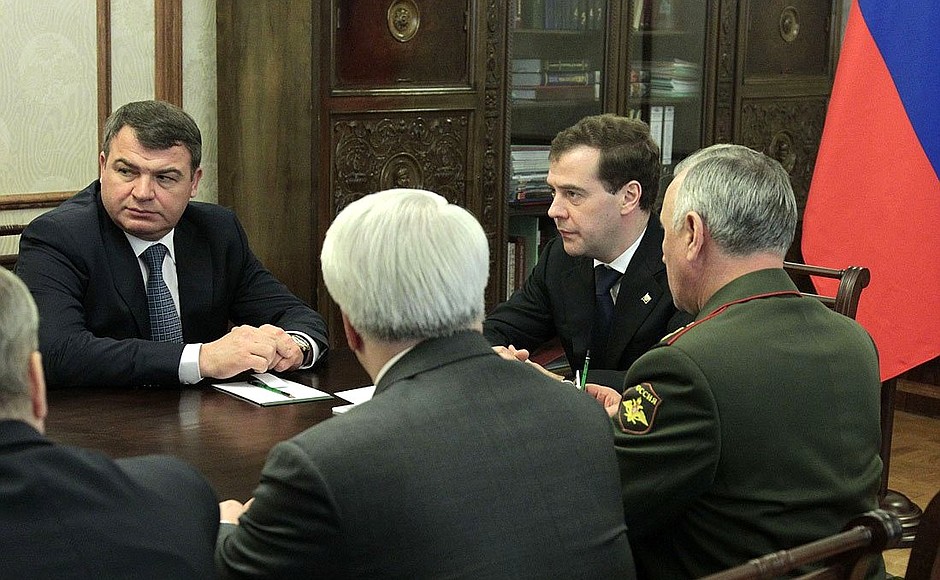The President made use of a break in the board meeting to hold a separate meeting with senior Defence Ministry officials and military district commanders.
Taking part in the board meeting were the heads of central military command bodies, the chiefs of the different branches of the armed forces and commanders of the different forces, and heads of the military districts and armed forces’ groups. Also invited to the meeting were representatives of the Presidential Executive Office, Government, Federal Assembly, law enforcement agencies, and public organisations.
* * *
Speech at Expanded meeting of the Defence Ministry Board
President of Russia Dmitry Medvedev: Comrade officers,
This meeting of the Defence Ministry Board continues the discussion on military development. I will devote the main part of my remarks to this issue, of course, and analyse what has been accomplished so far and what still remains to be done.
Russia carries out a pragmatic and peaceful foreign policy aimed at protecting our national interests, ensuring our people’s security, and preventing our country from being drawn into a costly arms race. On April 8, 2010, the President of the United States and I signed the New START Treaty, which sets the parameters for strategic nuclear arms reductions over the next decade. Our partners and we ratified this treaty in January, and it came into force on February 5, 2011. This will certainly play a key part in ensuring international security, but it is not the only factor of course.
Developments in the international situation today and the continued existence of a number of security threats to our country, including along our borders, make comprehensive modernisation of our armed forces essential. More then two years ago now, in September 2008, I set the goal of giving our armed forces new features. We have made progress in this direction since then. The armed forces now have a new organisational structure and new military planning system, and also modernised training, logistics and supply systems. But at the same time, we still have much work to do to bring the armed forces’ structure, arms, and combat potential into line with modern demands. The task is threefold: we need new arms, a new quality of troop command, and a new status for our officers.
I draw your attention to the following aspects essential for resolving this task. First, we need to ensure that the new state arms procurement programme is carried out as effectively as possible. This programme was approved on December 31, 2010, and unprecedented money – almost 20 trillion rubles – has been earmarked to fund its implementation. The task remains as before: modern arms and equipment must account for at least 70 percent of total supplies in the armed forces by 2020. We must strike a balance of interests between those placing the arms procurement orders and those carrying out the contracts. At the same time, state arms procurement orders should offer companies reasonable profitability – and I stress the term ‘reasonable’ here – making it possible for them to develop and introduce new technology. Prices for defence industry goods must be clear and transparent, and companies should bear extra responsibility for carrying out state arms procurement contracts.
Unfortunately, however, I have to say that some state defence procurement obligations have not been properly carried out. I will soon go through these cases and identify those responsible in the defence industry and in the government bodies.
Let me say again that the main criterion for measuring the defence industry’s effectiveness is its ability to carry out the state arms procurement programme. This programme’s implementation should be tightly pegged to the new federal targeted programme for developing the defence industry. This is something that has been fixed in law, but unfortunately, there have been unjustified delays in getting the federal targeted programme approved. I will not dwell on this issue right now, we will discuss it at another meeting soon.
Second, we need to improve dramatically the quality of troop command, especially at the level of joint strategic command and army command. All command tasks need to be thoroughly worked through during the exercises that take place, including the Centre-2011 exercises, in which our partners in the Collective Security Treaty Organisation will also take part. We must give serious attention not just to interaction between the different branches and troops in the armed forces, but also to cooperation with our military allies’ armed forces.
Third, we need to continue optimising the armed forces’ organisational structure. This year we must put in place a unified air and space defence system. We need to unite the existing air and missile defence systems, the early missile attack warning system and space monitoring system under one common command. This must not be abstract command, a system that exists only on paper or in electronic form, but must be a real system that fits the current circumstances, and this includes settling the question of whether or not we will participate in the European missile defence system that is being created. Taking into account where our units are stationed, we will need to develop several large air force bases. This will make our armed forces units more mobile and make it possible to build a multi-layered military infrastructure in the main strategic directions.
Fourth of course is defence of our borders on all sides. In some areas the decisions have already been taken and carried out. We need to work on the other areas, including the eastern borders. A number of garrisons located on the Kamchatka Peninsula were modernised a few years ago, and now we need to start modernising the defence infrastructure in the other regions in the Far East. The infrastructure itself needs to be modernised, and the servicemen and their families must have decent living and working conditions. This work has begun and it now must continue and be fully completed.
Our fifth priority, which I mentioned at the start, when I said we have a threefold task, is to raise our officers to a new social status, and this includes the overall task of building up the officer corps and bolstering social protection for active and retired servicemen.
We need officers with comprehensive training to modernize our armed forces. This is an especially important issue for the heads and teaching staff at our military academies. Our armed forces need commanders who know how to use modern arms and technology, and who know how to teach their use to the soldiers doing compulsory military service, which is now only one year long.
We also need to improve human resources work in the armed forces and make sure that properly trained officers are selected for command posts. We have gained some good experience in this area. This year, for example, of the 115 officers selected for the federal armed forces’ personnel reserve, 28 have already been appointed to command posts. This is the right direction.
Regarding the social protection guarantees, all of the required decisions have already been made. I stress this fact. Service pay will triple starting from January 1 next year. In accordance with my earlier instructions, a minimum wage of 50,000 rubles a month has been set for servicemen from the first officer post (platoon commander) to the first officer rank – lieutenant. Retired servicemen’s pensions will increase by at least 1.6-fold. We are also examining the possibility of introducing a voluntary pension savings system to help increase the overall volume of pension funds.
Furthermore, I have instructed the Government to report by June 1 on the final preparations for moving over to the new service pay system. The Government must carry out this task. There is still some time left to settle the remaining technical matters.
* * *
I want to add a few remarks to what I said earlier, and what was said in the Minister’s report, including as regards several of the proposals that were made.
Let me begin with the new service pay system. Much long and hard discussion went into agreeing and finalising this system, but we have all finally reached agreement, and it now has presidential approval. The current practice in the armed forces — that of implementing Order 400 — has shown the benefits of incentive systems of this kind. I have approved the decision to move over to the new service pay system starting from next year, but I agree that after this new system comes into effect we should still retain incentive programmes. What will happen in actual fact is that the incentives we provided under the Order 400 incentive programme will become part of the standard service pay. But we do need a system of bonuses and incentives too, because payment for any work, and this includes servicemen’s work, traditionally is made up of two parts: the actual set wages, the service pay in this case, and the bonuses and incentives offered on top. I ask you therefore to look into what kind of incentives we could offer, taking into account the state budget situation right now, but keeping in mind that we do clearly need to have a system of incentives in place in addition to the service pay package. In other words, we need to offer bonuses for good service.
On the question of arms supplies, I said in my opening remarks that I will be monitoring the situation with arms and military equipment deliveries. Despite the difficulties we have faced of late, there is enough money for this work, but unfortunately, there is also plenty of parasitism too, especially from the suppliers. We need to decide where we will go from here. All of the actors in the various links in this chain need to realise clearly that they must fulfil the commitments they have made. But some companies pile up the orders, getting them in the first place by setting unjustifiably low prices, essentially unrealistic prices, and then demand that the contract price be raised, and this is unacceptable. I therefore say to the heads of the defence industry companies here today, and to the Government officials, that this vicious circle must be broken, because if we do not stop this practice we will not be able to reach the goal that I spoke of, namely re-equipping our armed forces with new arms by 2020. We have the money for this work, but we need to put this sector into order first.
I said a few words about the social protection package, but let me add that I confirm once again here that the housing construction programme will continue and be completed in line with the possibilities we have today, and according to the timetable that we set. I am talking about permanent housing and service housing. The funds have been earmarked for all of this work. And we will continue to address the pension issue too of course, in order to ensure that military pensions are at a decent level as compared with general pension provisions in the country.
You mentioned the possibility of transferring real estate in order to free the Defence Ministry from a number of non-defence sites without state registration. I am ready to issue such an instruction, but we would need to make sure that these transfers are handled in proper fashion and that swindlers do not seize the chance to get their hands on these deals, because otherwise we could end up losing half of what is transferred altogether. We have already had enough assets slip through our fingers and vanish over the years. Study the issue of course, but remember that anything here requires close monitoring, because the whole state real estate registration system exists in the first place to minimise the risk of swindlers getting involved.
You mentioned the communications issue too. I think this is one of the key issues for making our armed forces more combat ready, and then there is also the issue of communications between servicemen and their families. This is something that has suffered considerable neglect in past years.
I held a special meeting of the Security Council, and meetings of the General Staff and a number of other organisations, and I am waiting for the results. I have seen some of the new developments. They are fairly modern new products and should now be properly prepared so that samples can be tried out in practice. We have set aside the funds for this.
Reforming military education was another of the issues raised today. Reform is underway and we have obtained some results, but many questions remain too. I want the Defence Minister to make a separate report on this at the Security Council meeting.
Getting the required numbers of armed forces servicemen is also an issue that remains at the centre of attention, because we cannot obtain decent results here if we do not achieve the right balance. I have already approved the current figures, as the Defence Minister reported, and we will proceed based on these figures, considerations, and possibilities, but I will make adjustments of course if the circumstances and forecasts demand it. You should all rest assured that if any additional changes are needed we will do this.
The Defence Minister also mentioned the issue of breaches of the law. Of course, breaches of the law happen everywhere, and unfortunately, the armed forces are no exception. But we need to continue fighting this, and not just addressing the problem of hazing, which has been the subject of much discussion, but also the problem of corruption too, as was rightly said. This requires systemic work. Each case should be very thoroughly investigated, because corruption discredits all that we have been trying to achieve over these last years.
Report to me separately, together with the Prosecutor General, on cases involving corruption, the people involved, and on your proposals for improving the personnel situation, and on criminal liability of people implicated in corruption cases.
I wish you successful work at the expanded meeting of the Defence Ministry Board.



